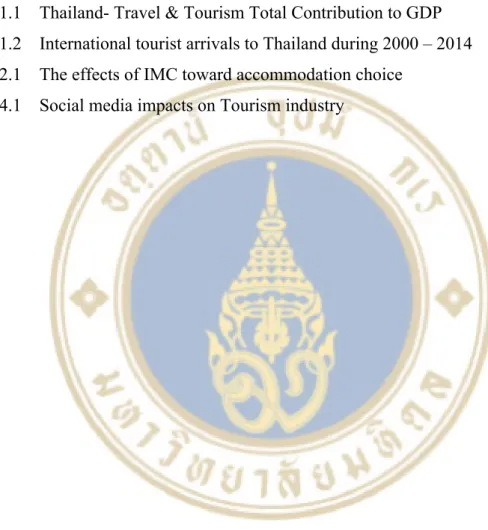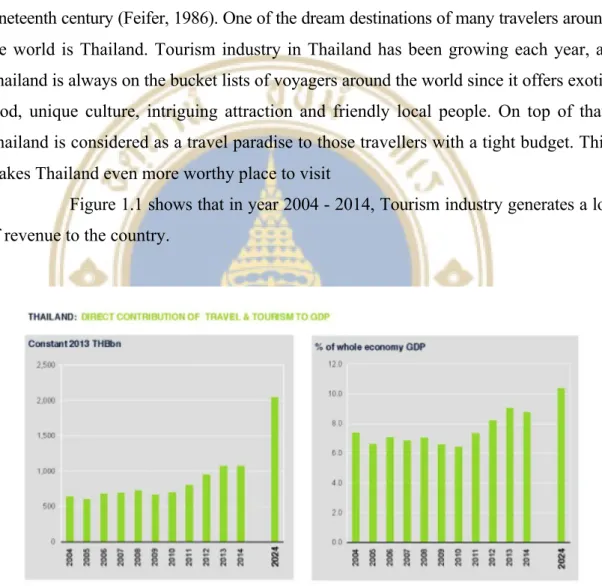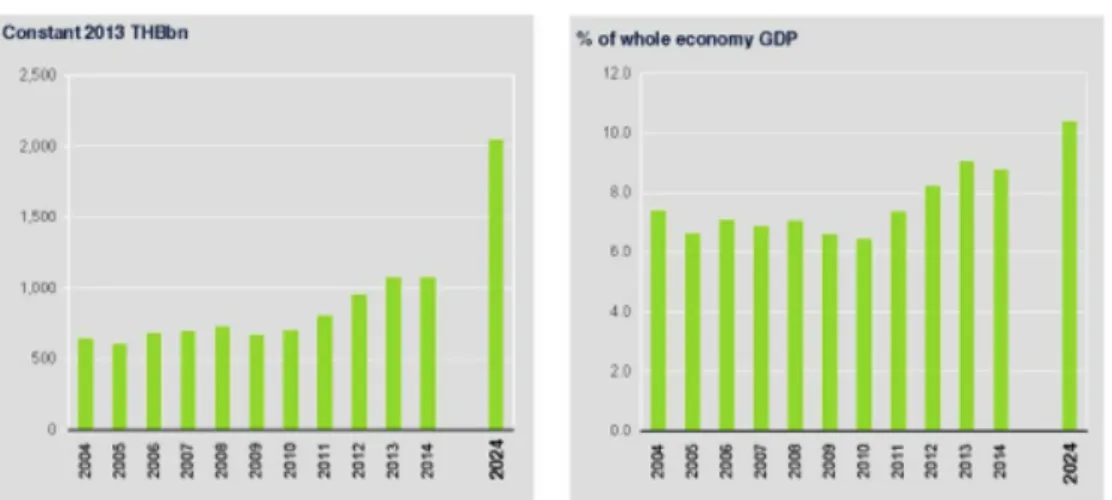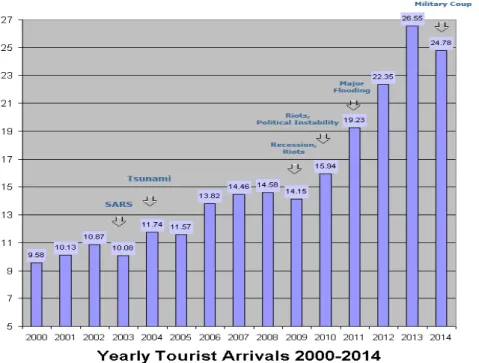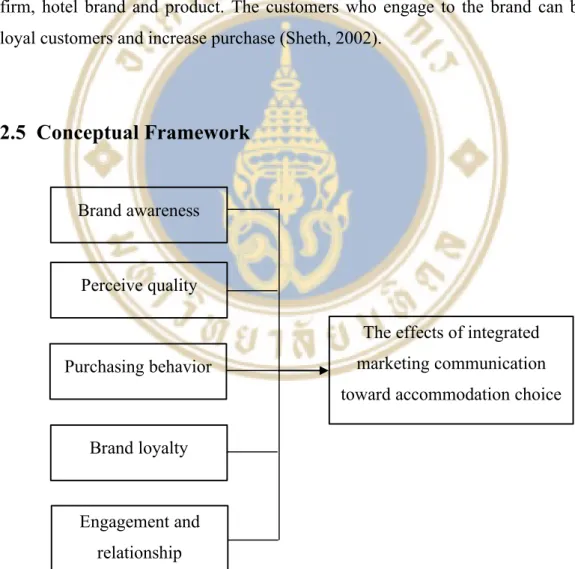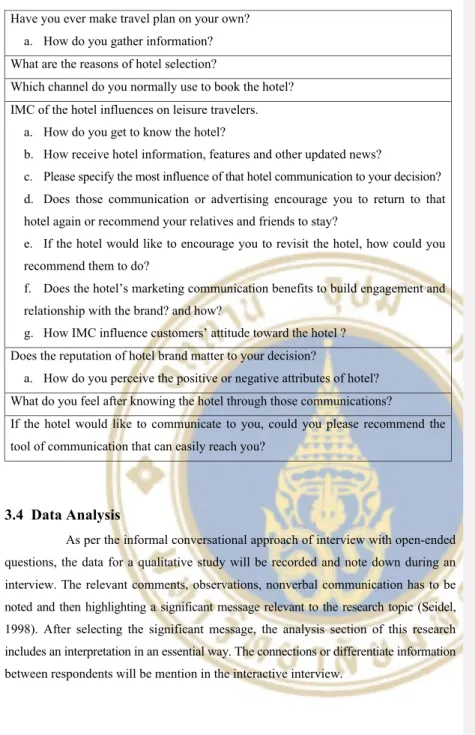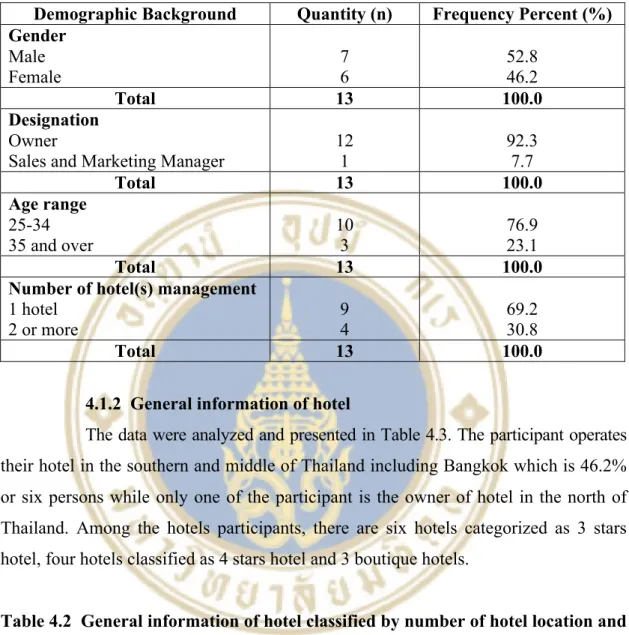THE EFFECTS OF INTEGRATED MARKETING COMMUNICATION: THE CASE STUDY OF A THREE TO FOUR STAR HOTEL. This study aimed to find out how the integrated marketing communications can influence and benefit the mid-sized hotels, which are three to four star hotels. In the fierce competition of business, the concept of integrated marketing communications has been applied.
Today, marketing communications has shifted to integrated marketing communications (IMC) as a result of the corporate movement.
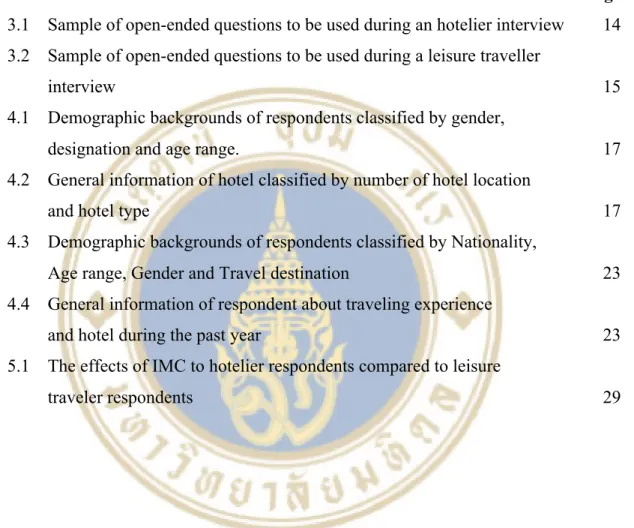
Research Objective
The Emergence of IMC
The Definition of IMC
The Tools for IMC
It is the incentive program that provides additional value to the product or service and motivates customers to purchase larger quantities. It has greatly accelerated the ability of marketing communication to easily reach target customers, especially Generation Y consumers (Fill, 2002). According to the change in the market and a single means of marketing communication is not able to achieve the goal of marketing communication by itself (Kitchen et al., 2004).
Therefore, the emergence of IMC appears as an effective way of marketing communication in this sophisticated market (Kim et al., 2004) and the acceptance of IMC is increasing significantly (Strasser, 2009; Kitchen and Schultz 2009).
Determinants of IMC in tourism industry
- Brand awareness
- Perceive quality
- Purchasing behavior
- Brand loyalty
- Engagement and relationship
Mittal and Baker (2002) emphasized the intangibility of the way to communicate the abstract benefits. Intangibility, a need to understand and communicate the physical experience of the service to potential customers. They supported that the IMC is used to create brand identity, position the brand and create demand, which is the key objective of communication.
In addition, the hospitality companies must communicate the special characteristics of the service and provide useful examples to build trust among consumers. The IMC produces from the consistent approach to marketing through the many different channels and it obviously benefits the marketers as it helps to reduce the cost of marketing and maximize the effectiveness. One of the main points for applying IMC is to influence buying behavior, which is a customer-based concept.
Therefore, the message sender or marketer must do more than just influence brand awareness or improve customer attitudes toward product quality. The authors found that the IMC through public relations, advertising, direct sales and promotion makes the influence of each factor different within different demographic groups. The groups tend to be loyal to the brand they have previously experienced and recommend to their family and friends.
In doing so, in this study I aim to fill the gap in the literature of perceived IMC in the field of sales and brand awareness implementation, especially in the area of the leisure traveler dimension within the hotel sector. The customers who engage with the brand can become loyal customers and increase purchases (Sheth, 2002).
Conceptual Framework
The research methodology used in this study is described in 4 sections consisting of the research design, population and sample, followed by data collection and analysis. These benefits enable researchers to interpret and better understand the complex reality of the effectiveness of applying IMC. The age range is between 25 and 44 years, because this sample group is among the largest group of internet users worldwide; the statistics portal (2014) provides information on the age distribution of Internet users: 47.1% of global Internet users were between 25 and 44 years old.
In-depth interview will be adopted to explore and assess their perceptions and experiences towards hotel BNK. Hotelier participants come from hotel owners and traders around Thailand, at the same time, leisure traveler participants consist of Thai and foreign travelers. The in-depth interview is one of the most common methods of data collection in qualitative research where an in-depth and in-depth response is required.
To be able to identify the effect of IMC in the hotel industry, the researcher will conduct semi-structured interviews to get the effectiveness of the answer. The open questions and free flow of conversation will be used during the interview with the aim of gaining real experience and the respondent is encouraged to speak and share their opinion. If the hotel wants to encourage you to visit the hotel again, how can you recommend them to do so.
If the hotel wants to communicate with you, please recommend the means of communication that can easily reach you. It then discusses the research on the marketing communication that can influence travelers' decision-making in hotel selection, which was collected through in-depth interviews of 13 respondents who traveled and stayed in 3-4 star hotels in the past year.
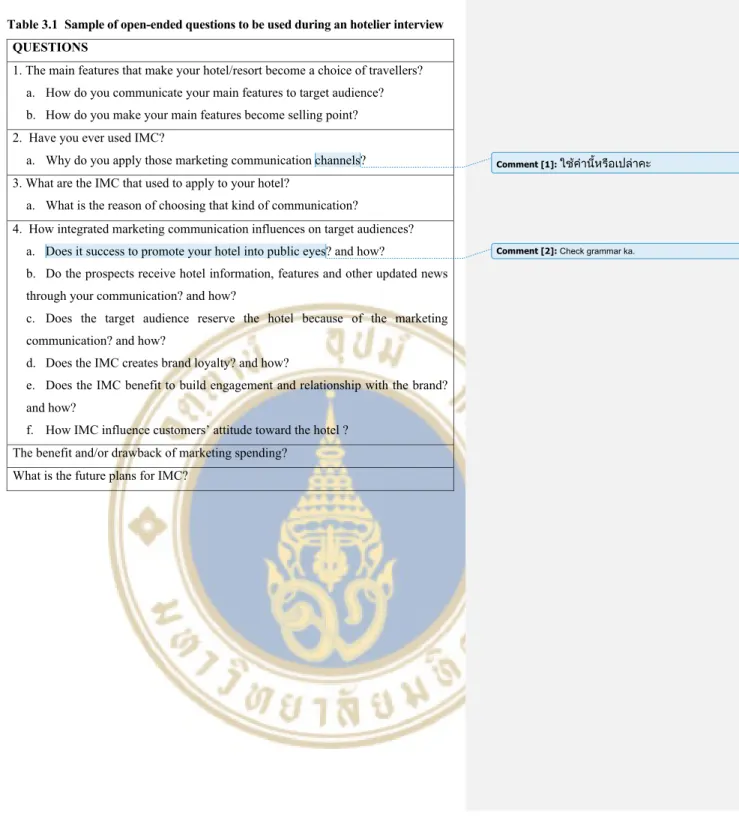
Hotelier
Demographic profiles of respondents
The first part of this chapter begins with the results and analysis of demographic respondents, followed by the general information provided by the respondent about travel experience and hotel during the past year. The research continues to discover the effect of IMC for hoteliers in different parts of Thailand.
General information of hotel
Effect of IMC in hotelier’s perspective
Purchase Intention
Shah and D'Souza, 2009 stated that there are four categories of outcomes; the campaign recognition, the promotion recall, the persuasion and the ultimate result is purchase behavior which used to measure whether the campaign has an effect on brand purchases.
Accommodation Knowledge and Attitude (Perceive Quality)
Brand Awareness
Brand Loyalty
Engagement and Relationship
Leisure Traveler
Demographic profiles of respondents
General Information of respondents
The effect of IMC in leisure traveler's perspective
The results for this study come from 13 participants who have traveled alone in the past year and the list(s) of their hotels are 3-4 star or boutique hotels. The participants do not focus on the hotel chains or 5-star hotels; but instead they prefer to stay in hotels that offer great value for money. However, the result showed that the majority of participants experienced known effects of IMC hotels; Perceived quality comes first for 11 out of 13 respondents, followed by involvement with the hotel through IMC (8 out of 13 respondents) and purchasing behavior (7 out of 13).
Perceive Quality
Engagement
The respondents travel to different destinations for example: Pattaya, Phuket, Koh Samui and some of them traveled abroad to Malaysia, India and Hong Kong. Social media applications in particular easily create relationships with consumers (encourages long-term relationships and loyalty) and prospects (awareness). Here are a few conversations that took place with thirteen leisure travelers, some of them mentioned here below for example.
I was choosing the hotel in Koh Phuket and there were so many nice hotels to choose from. Finally I chose the one that exists on Pantip.com, this channel allows you to ask questions about nearby restaurants or hotels and make sure that the beautiful photos that the hotel shows on the website are similar to reality" Male, 38 years old . My friends and I went to India 3 years ago and stayed at a hotel called Snow Valley, which is roughly a 3-star hotel.
To be honest, the cleanliness of this hotel did not meet our expectation; so we decided to give a review on Agoda.com, the channel through which we booked. I booked 2 nights at Snow Valley directly from the hotel email and received a special 10% discount as I mentioned on the email that I had visited this place before. It is clear that the improvement of hotel comes from customer comments to maximize customer satisfaction and I was also impressed with the development of hotel” Male, 31 years old.
Social media gives travel providers the opportunity to build emotional context and intimate relationships with customers to engage both customers and prospects.
Purchasing Behavior
He showed concern about the location of the hotel, so he searched through Google map according to his preferred location and found the hotel around that area. The location of the hotel is a big factor in whether I choose to stay or not.
Brand Loyalty
In any case, it made a good memory during our short period of stay and this is another big reason why I prefer to return to this hotel” Female, 32 years old. I stayed in a very nice hotel called Sawan Resort while traveling to Koh Samed and the next time I went to Samed Villa. As for my personal opinion, I think different hotels offer their own unique style of service; therefore it will be more interesting to experience a new thing” Male, 30 years old.
RECOMMENDATIONS
- Discussion and Conclusion
- Practical Implications
- Limitations of the Study
- Recommendations for Future Research
This finding can be defended by the brand regarding leisure travelers who prefer to gather information about the hotel rather than pay attention to the brand. In terms of the number of three- to four-star hotels and boutique hotels, they have a higher volume compared to luxury or budget hotels. In a period of oversupply, IMC in the mid-range tourism industry must consider how to communicate immediately with clients, rather than with a target audience that may have the opportunity to travel to the hotel in the future.
According to the interview, in a qualitative method, the research concludes that IMC has had a positive impact on three- to four-star hotels and boutique hotels. For hoteliers, IMC is considered a bridge leading to the success zone. The abstractness of the service industry forces the company to use marketing communication to clearly communicate its product to the potential customer.
The hotelier expects to create brand awareness among the target audience, while the result reveals that leisure travelers who stayed in three- to four-star hotels or boutique hotels did not mention any relationship with marketing communication about brand awareness. The sustainability of hotel business must focus in some positive way on terms of interaction before they arrive at the accommodation, during their period stay or after they leave the hotel. The marketing communication of medium to medium-high level hotels will instead focus on online channels to communicate with the targeted audience.
The influence of business orientations in small tourism businesses on the success of integrated marketing communications. Comparing the application of integrated marketing communications (IMC) in magazine advertising across product type and time. This interview is part of a study to study the effects of integrated marketing communications of three- to four-star hotels.
The effect of Integrated Marketing Communication for this study consists of purchase intention, accommodation knowledge and attitude (True quality), brand awareness, brand loyalty, involvement and relationship with the customers.
